Latest Posts

The launch of the European Rule of Law Mechanism in July 2019 marks the renewed opportunity for the European Union (EU) to uphold democracy and overcome the limits of the Article 7 procedure. Among the proposed actions, the announcement by the European Commission Vice President for Values and Transparency Věra Jourová of a dedicated chapter to media freedom and pluralism in the Annual Rule of Law Report was strongly welcomed by press freedom and journalists’ organisations. It is not only the acknowledgment that independent journalism and access to pluralistic information are one of the pillars of democracy, but also a key step in addressing the worrying state of media freedom and pluralism in the EU.
The killings of Daphne Caruana Galizia in Malta and Ján Kuciak in Slovakia shed light on the numerous threats faced by journalists within EU member states. Journalists are daily exposed to censorship, intimidation, online and offline harassment, abusive lawsuits and physical violence for doing their work and exercising their fundamental right to freedom of expression. In parallel, media capture by states and ownership concentration by private actors pose a huge threat to media pluralism, in a broader context where the media sector struggles for its financial sustainability. This has a chilling effect on press freedom and endangers citizens’ right to information. As the COVID-19 crisis is being used by some governments to curtail rule of law principles, access to information is essential for the public’s right to know. This crisis also illustrates the crucial need for safe working conditions for journalists and an independent, pluralistic and sustainable media sector.
It is crucial that EU decision-makers aim for an ambitious European Rule of Law Mechanism, effectively upholding press freedom and media pluralism and leading to concrete improvements for journalists and the media sector. The following recommendations outline how to make the Mechanism strong, timely, inclusive and representative of the challenges faced by journalists and the media sector.
Recommendation 1:
Assessing the timeliness of the Annual Rule of Law Report
The July 2019 Communication was followed by the firm political commitment of the new College of EU Commissioners to implement the Mechanism in a comprehensive way5. The European Commission Work Programme foresees the Annual Rule of Law Report as one of its 2020 deliverables. This is welcome, given the challenges faced by journalists and the media sector.
We understand and support the urge to move forward on the release of the report, in spite of the disruption brought by the COVID-19 crisis. However, the press freedom community is united in its shared vision that the issuing of the Annual Rule of Law Report should be durable, critical and permanent.
For these reasons, the Annual Rule of Law should only be released when it:
- Provides high-quality content and added value to existing evidence (see recommendation 4);
- Paves the way for tailor-made recommendations and leads to concrete changes in EU member states (see recommendation 2);
- Takes into account and analyses the emergency measures taken in 2020 in the context of the COVID-19 crisis and their impact on press freedom and the rule of law.
Recommendation 2:
Strengthening the Mechanism with country-specific recommendations, developing effective responses and establishing a sanction system
Monitoring the state of press freedom and media pluralism in all EU member states is strongly welcome and needed. However, for the Mechanism to lead to concrete changes, we believe the Annual Rule of Law Report should be accompanied by:
- Country-specific recommendations: based on the evidence collected in each EU member state. Inspiration could be drawn from the European Semester. Across the years, this process was strengthened by tailor-made national recommendations and a tracking system of their implementation by the European Commission. A similar approach could be taken to strengthen the impact of the Mechanism. Recommendations should be framed within the context of Member States’ existing obligations under other intergovernmental bodies, such as Council of Europe commitments, and could complement existing international efforts to support Member States in their response to addressing press freedom and the safety of journalists.
- Using recommendations to strengthen Member States’ capacity and EU competency: Country-specific recommendations should be used as a foundation for all EU institutions to assess their capacity to defend press freedom and the safety of journalists, with a view to establishing, through all necessary policy, legislative, and budgetary measures, ways to remedy possible deficiencies at EU Member State level, and within the institutions themselves, and in turn provide a long-term, meaningful improvement to press freedom in the bloc.
- Sanctions for serious and systematic breaches of the rule of law: Evidence collected through the Mechanism should be used to activate the future rule of law conditionality clause of the Multiannual Financial Framework 2021-2027, and lead to the potential suspension of EU structural funds to Member States or local/regional authorities.
Recommendation 3:
Reflecting individuals, voices and diversity in the Annual Rule of Law Report
The need to take into account various sources of information is rightly acknowledged in the July 2019 Communication. A bottom-up approach is key to make the Annual Rule of Law Report meaningful, given the potential of the Mechanism to bring about positive change to the lives of millions of citizens. In this regard, the approach of the European Commission should be transparent and inclusive.
The targeted stakeholder consultation launched on 24 March 2020 gives the possibility to a wide range of actors, such as civil society organisations, to feed into the process, but is hardly accessible to those who are not acquainted with EU-level technical language. Reports produced by academic and civil society organisations can be strengthened by insights from journalists, judges and other rule of law defenders. Ensuring a broad capture of national research, opinions and evidence would endow the Mechanism with greater credibility and recognition, and promote civil society inclusion in Member States where the rule of law is threatened.
There is still time to make the content of the Annual Rule of Law Report inclusive of a diversity of sources, by setting out a publicly-available communications plan for engaging a range of stakeholders. This could include:
- Launching a complementary public online consultation, targeting journalists, judges and other individuals working or involved in rule of law related issues at the national and local levels. Such a consultation would allow individuals or bodies to easily submit relevant material, including statements, reports and opinions that would provide essential information and expertise. The Commission should also take measures to actively promote the complementary public online consultation to a wide, external audience.
- Making the March 2020 stakeholder consultation available in all EU languages,
- Consulting journalists, judges and other individuals working or involved in rule of law related issues during the European Commission country visits,
- Ensuring emblematic individual cases are considered during country visits, included in the report, and remedy in their cases is made a priority.
- Using the connections of European and national networks of journalists, judges and other rule of law defenders to gather insights about facts and individual cases.
- Complementing the findings of the 2020 Media Pluralism Monitor with already existing sources, such as the alerts and country responses of the Council of Europe Platform for the Protection of Journalism and Safety of Journalists,
Recommendation 4:
Ensuring the Annual Rule of Law Report effectively captures the challenges faced by journalists and the media sector
As previously stated, the findings of the first Annual Rule of Law Report are not only an opportunity to lead to concrete improvements at Member State-level. They can also inform upcoming initiatives such as the European Democracy Action Plan, or the Media Action Plan, and pave the way for stronger EU-level action to support an independent, pluralistic and sustainable media sector.
To do so, the report must cover the wide range of challenges faced by journalists and the media sector.Whilst some of these issues are already addressed in the March 2020 stakeholder consultation and the 2020 Media Pluralism Monitor, the following list gives an overview of these challenges. They are based on international and EU standards, such as the 2014 EU Human Rights Guidelines on Freedom of Expression Online and Offline and the 2016 Council of Europe recommendation on the protection of journalism and safety of journalists and other media actors.
We believe the Annual Rule of Law report should cover and assess the following areas:
1. Transparency of ownership and government interference
- Adoption and enforcement of rules governing transparency of media ownership
- Media capture by state actors, including:
- Degree of state control in private media outlets
- Degree of state control in public service media
- Transparent allocation of state advertising
- Transparent allocation of state subsidies
- Ownership by private actors, including:
- Degree of concentration of ownership by national private actors
- Ownership rate by foreign actors
2. An environment conducive to an online and offline independent and pluralistic media landscape
- Adoption and enforcement of rules protecting the independence of the media and pluralism, as well as freedom of expression and access to information
- Sustainability of public and private media, including:
- Legal mechanisms reinforcing financial self-sustainability of both public and private media
- Financial mechanisms reinforcing financial self-sustainability of both public and private media
- Development and promotion of self-regulatory initiatives and mechanisms
- Powers and governance of media regulatory authorities and bodies, including:
- Independence, enforcement powers and adequacy of resources of media authorities andbodies
- Conditions and procedures for the appointment and dismissal of the head / members of thecollegiate body of media authorities and bodies
- Adoption and enforcement of rules ensuring free and pluralistic reporting on elections as well as equitable political party access to public service media during election campaigns
- Status and role of independent organisations in actively monitoring the situation of media freedom and pluralism in different countries
- Impact of emergency measures taken in the context of the COVID-19 crisis on press freedom and media pluralism
3. Framework for protection of journalists
- Adoption and implementation of a comprehensive legislative frameworks and other rules enabling a online and offline safe environment for journalists and other media actors, including:
- Prevention measures
- Provisions criminalising specific and serious attacks against journalists (arbitrary arrest,torture, threats to life and killing)
- Effective redress mechanisms for victims and their families
- Establishment of early-warning and rapid-response mechanisms
- Adequate procedural guarantees
- Adoption, mainstreaming and implementation of gender-sensitive approaches to address violence against female journalists and other media actors, including:
- Gender-sensitive legislation
- Gender-disaggregated data collection
- Awareness-raising
- Protection of victims
- Prosecution of perpetrators
- Establishment of effective, independent and impartial investigations into threats, killings,attacks, harassment, intimidation and ill-treatment of journalists and media workers
- Establishment of special judicial or non-judicial inquiries into specific cases or independent specialised bodies to conduct inquiries when investigations and prosecutions do not result inbringing to justice the perpetrators
- Development of protocols and training programmes for all state authorities who areresponsible for fulfilling obligations concerning the protection of journalists and other mediaactors
- Partnership with and supporting civil society and the media for getting their inputs whendeveloping legislative frameworks, promoting good practices, monitoring and reportingthreats and violence and raising awareness
- Impact of the COVID-19 crisis on the safety of journalists
Signatories
- ActiveWatch
- Association Mondiale des Radiodiffuseurs Communautaires Europe (AMARC Europe)
- Archiwum Osiatyńskiego
- ARTICLE 19
- Budapest Centre for Independent Journalism (CIJ)
- Committee to Protect Journalists (CPJ)
- Daphne Caruana Galizia Foundation
- DW Akademie
- European Centre for Press and Media Freedom (ECPMF)
- European Federation of Journalists (EFJ)
- Free Press Unlimited (FPU)
- Gazeta Wyborcza Foundation
- Global Forum for Media Development (GFMD)
- Hungarian Civil Liberties Union (HCLU)
- IFEX
- International Press Institute (IPI)
- Media Diversity Institute (MDI)
- Netherlands Helsinki Committee (NHC)
- Norsk PEN
- PEN International
- Reporters Without Borders (RSF)
- South East Europe Media Organisation (SEEMO)
- South East European Network for Professionalization of Media (SEENPM)
- Stichting Democracy & Media
Latest Posts
Auf unseren letztwöchigen persönlichen Aufruf, uns Stimmen aus der Quarantäne bzw. dem Ausnahmezustand zu schicken, haben uns schon einige Nachrichten aus der ganzen Welt erreicht – egal ob Tasmanien oder Finnland, USA oder Spanien: Die Krise verbindet und wir finden ähnliche Wege, damit umzugehen. Ein paar Stimmen waren am Donnerstag im Infomagazin FROzine zu hören, bzw. hier: https://www.fro.at/corona-wir-die-welt-ist-ein-dorf/
Wir erneuern unseren Aufruf und fragen diesmal nach:
Wie hilfst du in der Corona-Krise, welche positiven Momente hast du erlebt?
Wo hast du Hilfe in Anspruch genommen?

Verschiedene Initiativen und Plattformen zur Nachbarschaftshilfe in Zeiten von Corona gibt es mittlerweile, wir wollen eure Stories hören. Schickt uns eine Voice-Nachricht entweder per WhatsApp oder Signal an 0660 7172771.
Umfassende Berichterstattung auf Augenhöhe zur Corona-Krise – abseits der täglichen Pressekonferenzen der Bundesregierung – gibt es Montag bis Freitag auf Radio FRO:
12:00 – 12:30 Frequently Asked Questions
Das tägliche Corona-Update aus dem Freien Radio für ganz Österreich, produziert von Radio Helsinki/Graz.
17:00 – 17:30 (Di-Do) Corona Information
Gut recherchierte und wichtige Antworten auf brennende Fragen rund um den Covid-19 Ausnahmezustand von Radio Orange/Wien. Informationen auf Deutsch, Englisch, Arabisch, Farsi und Somali.
18:00 – 19:00 sowie Whlg. um 6:00, 13:00 FROzine
Das werktägliche Infomagazin FROzine (sowie freitags #Stimmlagen) von Radio FRO berichtet über die Auswirkungen der Corona-Krise auf Gesellschaft, Arbeit, Wirtschaft, Demokratie, Kultur etc.
Latest Posts
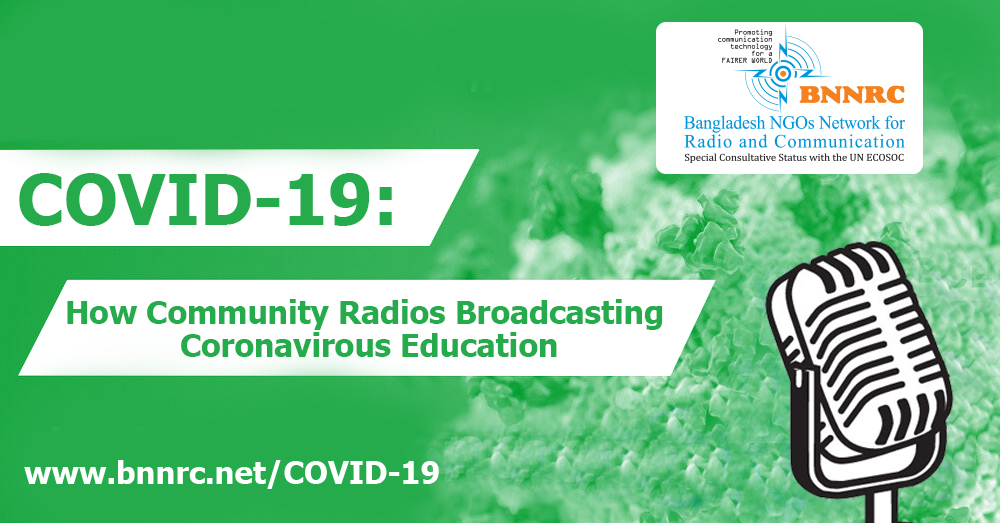
Bangladesh NGOs Network for Radio and Communication(BNNRC) has been mobilizing all community radios for developing and broadcasting awareness building programs on COVID-19: Coronavirus contamination to protect lives and livelihoods since March 1, 2020 in Bangladesh.
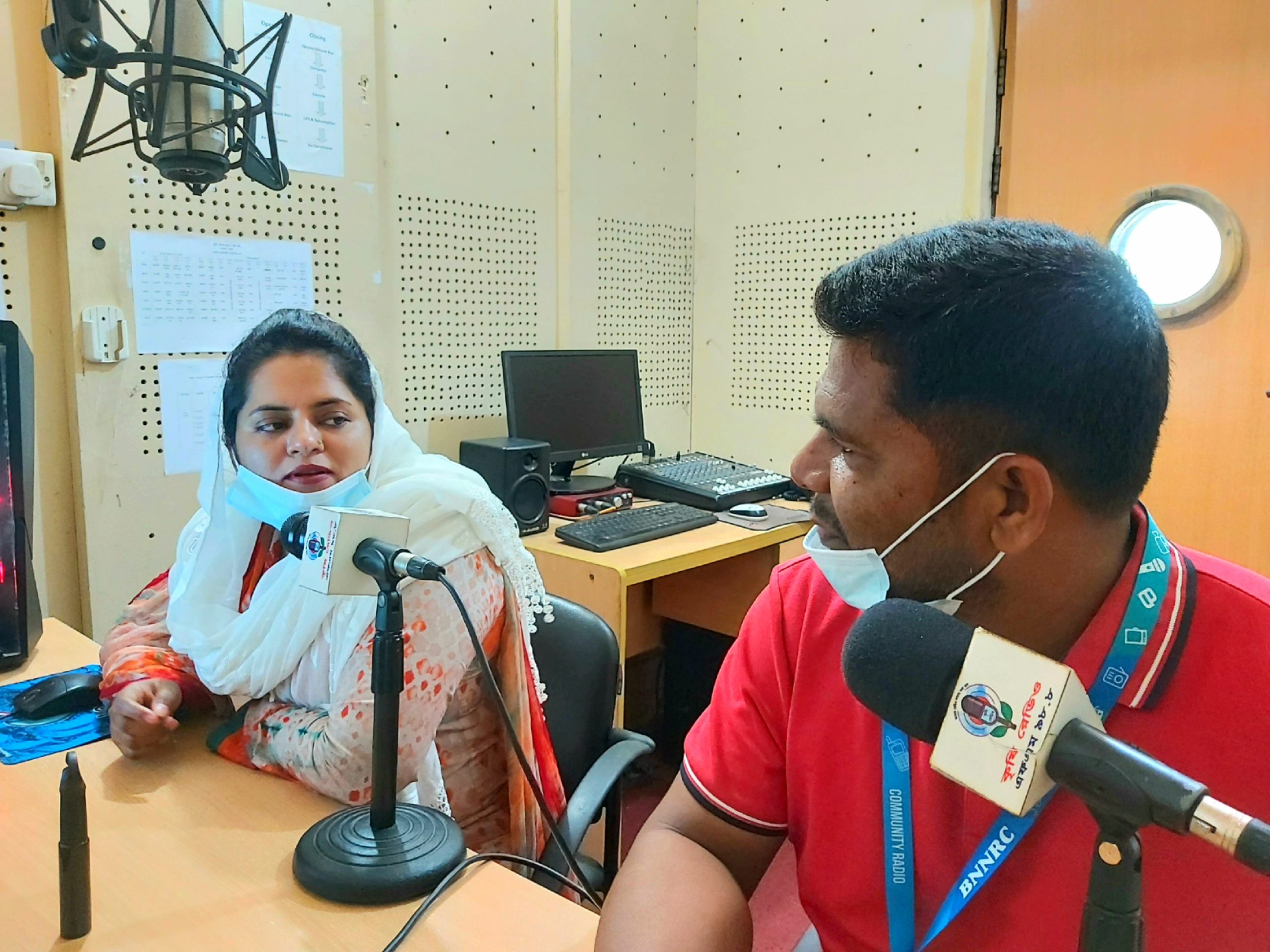
Programmatic interventions in response to COVID-19:
The COVID -19 demands cooperation among government, CSOs, local business communities, multi-stakeholders. BNNRC are continuing work 24×7 to reach rural communities in Bangladesh with life-changing information through the community radio. It’s not easy to get information to the hard-to-reach at the best of times, and we will continue to strive to make sure the needs of these communities are not forgotten. To that note, we’ll be continuing to share stories of our work, and the work of community broadcasters and rural people, while also supporting communities in getting the information they need about COVID-19.
In this perspective, BNNRC has been working on COVID -19 covering with the following issues:
1. Animate CSOs, Government, health service providers and communities for reinforcing collective action.
2. Keeping community people’s daily life normal and livelihood function
3. Mobilize further cooperation among government, CSOs, local market and communities’ responses
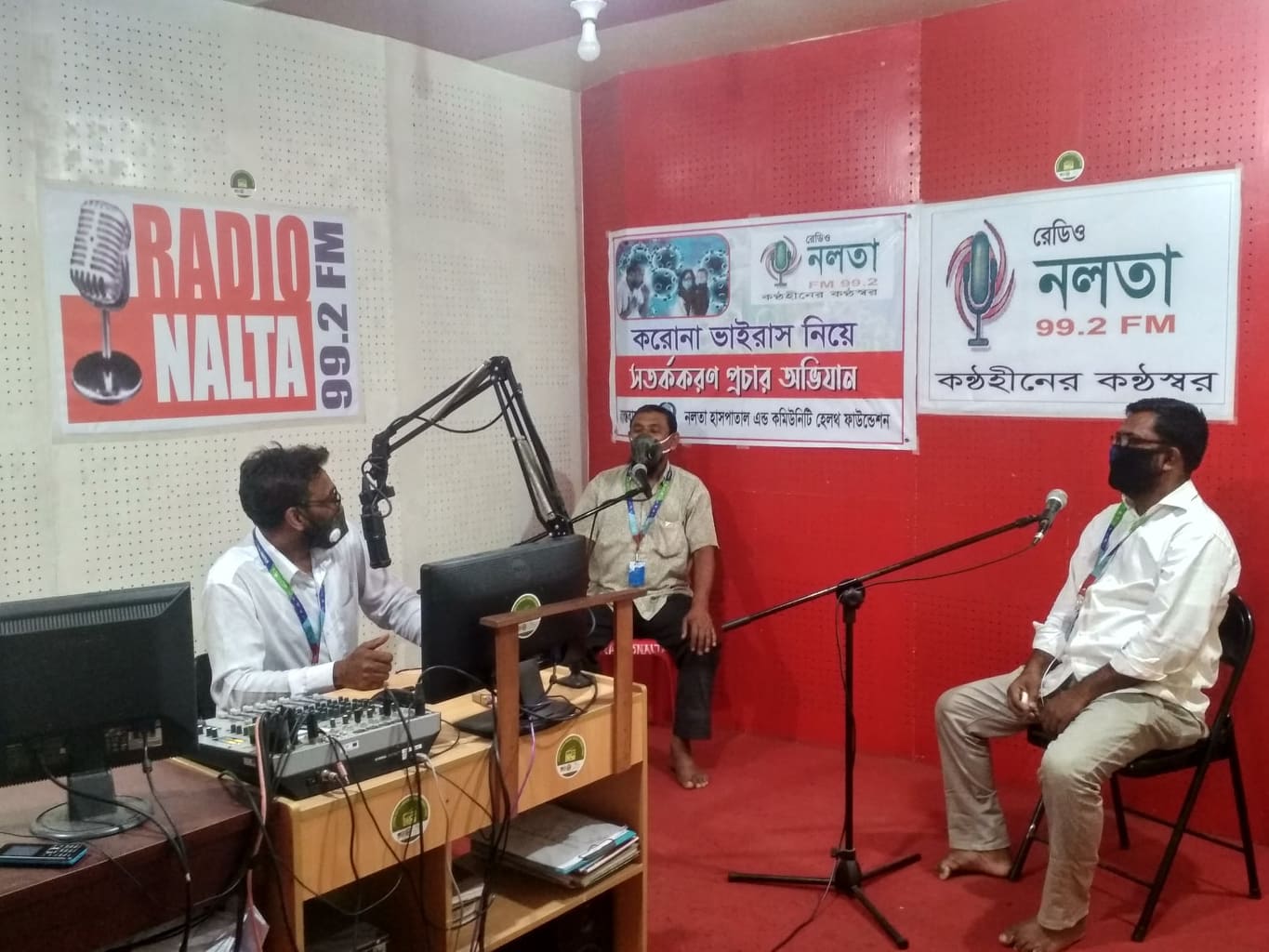
Actively distributing information and resources, including scripts and backgrounders, about how to plan and produce effective COVID-19 radio programming; Creating or activating spaces, such as social media groups, to give radio broadcasters a place to learn from each other about best practices in COVID-19 community radio programming; Developing connections between broadcasters and health authorities in government, and civil society to ensure accurate information goes out and myths are debunked; Reminding community broadcasters of the steps they can take to stay healthy; Commending community broadcasters and other journalists for being on the front line and continuing to work in these conditions.
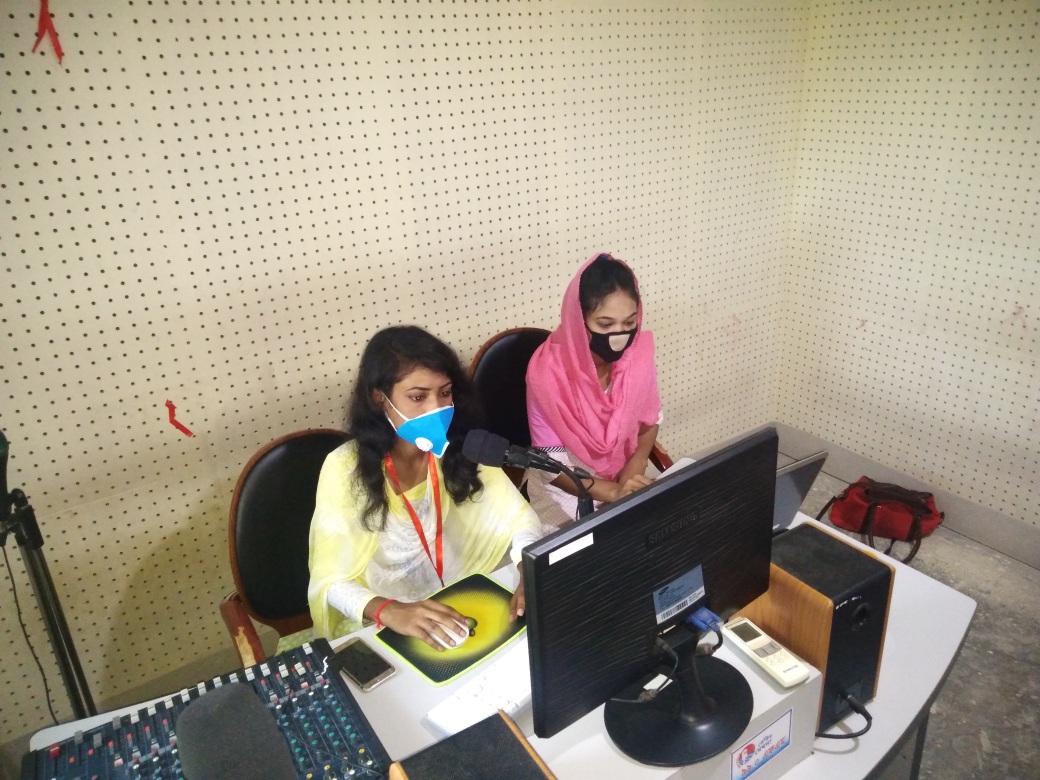
Future outlook and recommendations:
Community Radios stations, as one of the source of information, helping to raise awareness on COVID- 19 and reinforcing Behavior Change Communication (BCC) by CSOs, Government, health officials and locally elected bodies (LEB).
Community Radio stations are building awareness to change attitudes among community people at different points in their daily lives. Community Radio stations, as a platform for those who involve in COVID -19 responses to update rural communities. They are also providing a channel for two-way communication with community people where listeners are sending SMS or call in with questions.
Community Radio stations have been coordinating with the District and Upazila level Coronavirus Prevention Committees. Community Radio stations have assigned one broadcaster in each radio stations as the focal person to coordinate COVID – 19 programs.
Community Radio stations are broadcasting programs on COVID -19 in local languages or dialects. Community Radio stations are producing contents which speaks directly to localized issues and concerns, and features trusted local people in a way that nationally or regionally produced content cannot.
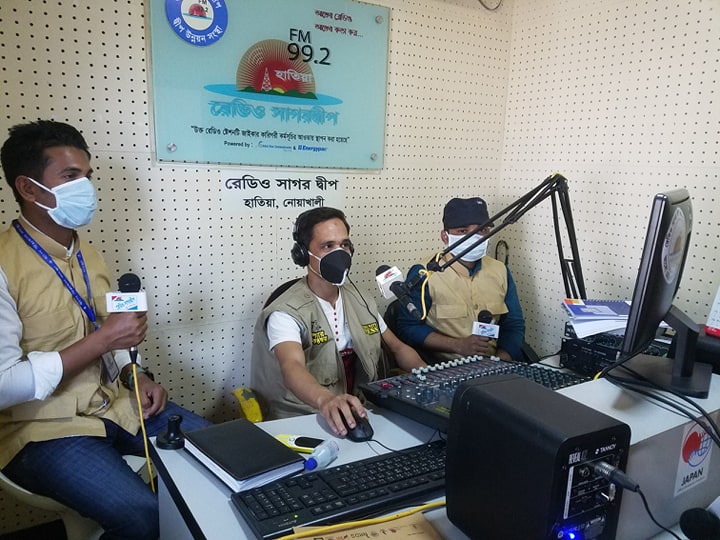
Challenges & Way forward
The rapid social distancing & Quarantine/ Isolation have caused massive pressure on the community radio sector extremely due to short notice. Fundraising process have been cancelled and revenues such as advertising income are drying up overnight resulting in immediate cash flow problems, cuts in grant-funded projects & many community radio stations have few or no cash reserve to tide them over situations like this.
There are things Government can do to help community radio stations to survive in this crisis so they can continue to serve communities.
(a) Upazilas and Districts administration (Local Government) could buy airtime from Community Radio stations.
(b) To substantially establish the Community Radio Trust Fund by Ministry of Information
© To establish a COVID-19 contents fund to support high quality and accurate local COVID-19 news reporting and the production of program or series of program that increase rural people understanding and contribute to psychological support during the present health emergency.
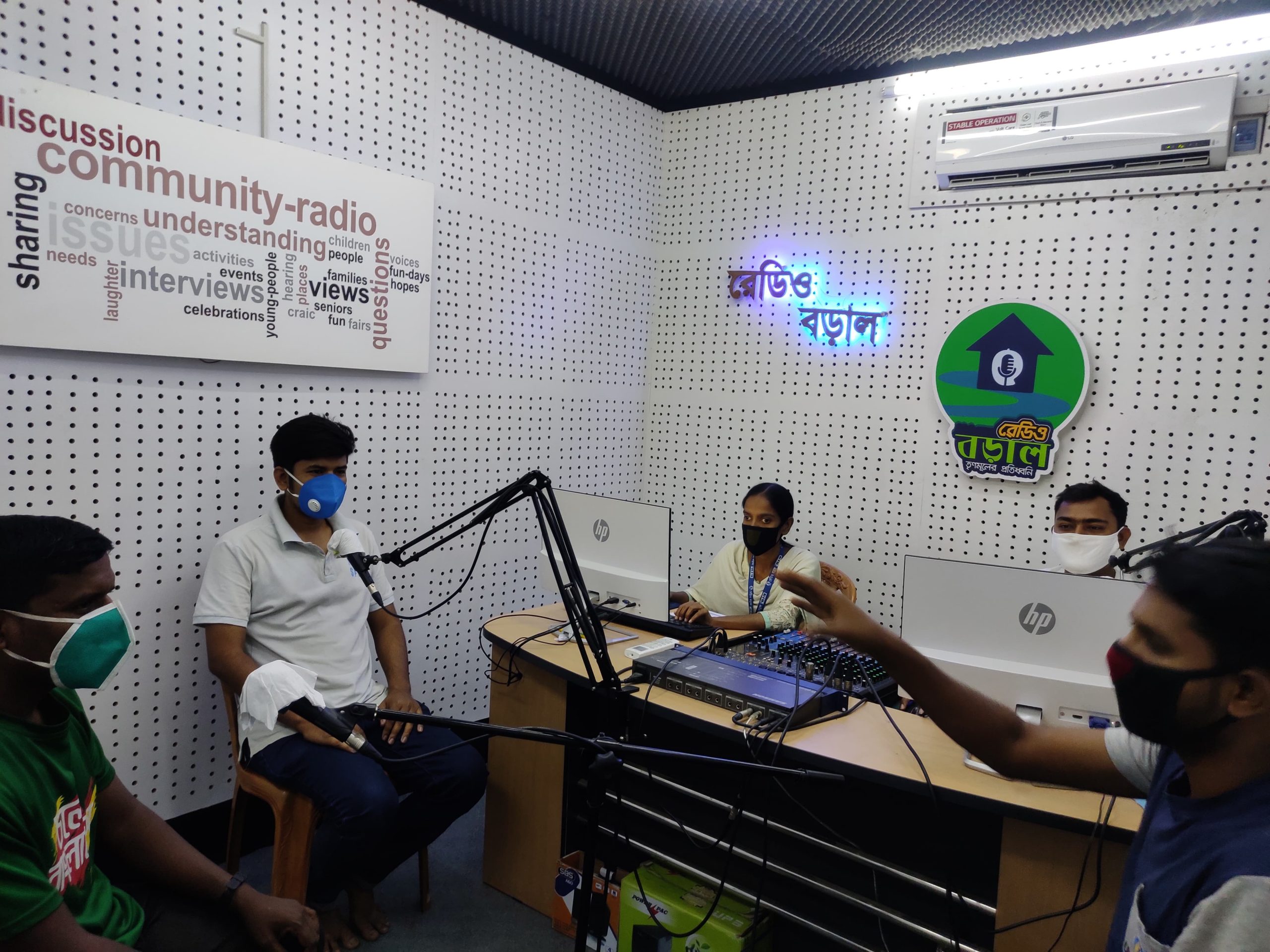
Implications:
It is really working and having a very positive effect at the rural communities. Community Radio stations help to reduce the panic of COVID – 19 gradually by broadcasting awareness programs. Now the community people are taking precautionary measures to prevent contamination of COVID – 19. People now understand more about the COVID – 19. Community Radio stations have already been established a well-trusted source of information for rural people of Bangladesh.
AHM Bazlur Rahman, Chief Executive Officer of Bangladesh NGOs Network for Radio and Communication(BNNRC)| bnnrcbd@gmail.com | +8801711881647 | www.bnnrc.net
Latest Posts
AMARC Europe is the membership organization serving the community radio movement across Europe. The political representation of this broadcasting sector is the driving principle of our initiatives and actions. A stronger network means more impact. With your AMARC membership fees you join over 300 community radio stations and federations in over 20 European countries and over 3.000 AMARC members worldwide with the aim to strengthen the community media sector in Europe and worldwide.
In November 2020 AMARC Europe will hold its General Assembly in Brussels/Belgium – detailed information coming soon. In the course of the General Assembly also all applications for new members will be discussed and approved. So, this is now the opportunity to become a full member with AMARC Europe.
We are also calling on our current members to update their membership details and fees and get in touch if there are any questions via members@amarceurope.eu.
We remind you that all the community radios, radio federations or production groups can apply for the full membership. Single persons, researchers or any other radio activist can only apply for the “associated member” status. Please check our website to get more information at this regard.
In line with our statutes, radio stations should be “up to date” with the payment of membership fees in order to have the (active and passive) right to vote during the General Assembly. This means that if the membership fees were not payed in the previous years, we kindly ask you at this stage to update your subscription including the previous unpaid membership fee.
Why to become AMARC member? 10 Good reasons to do it.
- AMARC Europe is promoting networking, lobbying and advocacy activities for the European community radio sector with European Union, Council of Europe, UN institutions and the civil society and NGO sector
- AMARC Europe promotes and gives visibility to Good and Best-Practice examples within and beyond the community media sector
- AMARC Europe provides political support for community media e.g. regulation processes, consultations on community media et al
- AMARC Europe opens up for free its office, meeting rooms and infrastructure in Brussels for members e.g. for meetings or events
- AMARC Europe provides continue communication and information exchange on the community radio environment in Europe and beyond
- AMARC Europe is a multi-channel dissemination platform for information, needs and demands of its members and the community media movement
- AMARC Europe is regularly organizing events & meetings on relevant topics for the community media sector
- AMARC Europe provides diverse opportunities for common projects and activities with European and Non-European partners – participation in a worldwide movement
- AMARC Europe offers possibilities for volunteers e.g. EVS
- Purchase the .radio domain for 25€ per year instead of 300€
You can pay your membership fee via the following options
Bank Transfer
Please transfer your membership fees (minimum 25€ per year) to the following bank account
Account Name: Association Mondiale des Radiodiffuseurs Communautaires Europe
Bank Name: BNP Paribas – Fortis
IBAN: BE46 0016 2258 0836
BIC/SWIFT: GEBABEBB
Paypal
You can also use PayPal to make your payment. Just use the link www.paypal.me/amarceurope and enter the respective amount (minimum 25€ per year)
Together We Are Stronger!
Latest Posts
|


